- Home
- Technical Cooperation Projects
- Index of Countries
- Africa
- Ghana
- Project for Improvement of Maternal and Neonatal Health Services Utilising CHPS System in the Upper West Region
- Project Activities
- Output 3: Community mobilization and support system on Maternal and Neonatal Health strengthened
Project Activities
Output 3: Community mobilization and support system on Maternal and Neonatal Health strengthened
Promoting Community Mobilization
The residents of a village need consent from the decision makers in their family when they use medical services. Their arrival at a health facility is delayed because it takes time to obtain such consent. In addition, most communities of the Upper West Region have difficulties in accessing health facilities because of the lack of necessary means of transportation for geographical and economic reasons.
Some areas of the Upper West Region have already subsidized health care costs by community fund. The Project needs to promote health promotion activities further in the community. In such activities, effective involvement of influential people who understand the social characteristics in the community, such as district assembly members and opinion leaders, is important.
The Project aims to build a foundation on which community people can conduct activities to improve their health status in cooperation with Community Health Officer (CHOs) by recognizing health problems of the community and the potential to address them.
For these reasons, the Project aims to build the following capacity of CHOs.
- Capacity to understand the situation of the community (Data collection, analysis, and sharing capacity);
- Ability to plan, do, monitor, and evaluate health activities (Activity management capacity); and
- Capacity to involve community people such as members of the community health committee(CHC) and community health volunteers(CHV), and encourage them to conduct community-based health activities (facilitation capacity)
The Project conducts training to build the capacity to identify people's needs, and plan, conduct, monitor, and evaluate activities by utilising the community health action plan (CHAP).
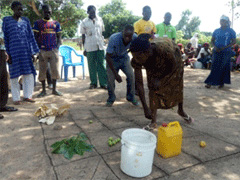 CHOs learn how to use participatory tools.
CHOs learn how to use participatory tools.
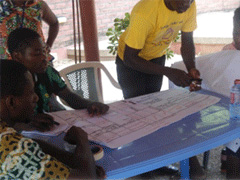 Group work in CHOs refresher training
Group work in CHOs refresher training
Capacity Building on Health Promotion
In the Upper West Region, local customs and traditional concepts affect negatively the utilization of maternal and child health services. Community people made comments such as the following: "It will not be safe pregnancy when they tell other people openly"; "It will not be safe pregnancy when mothers give birth in public space (CHPS compound, health centre, and hospital)"; and "Unassisted childbirth shows the bravery of the pregnant woman".
Even if a mother gives birth at a hospital, she goes home immediately after the delivery, due to which follow-up at health facilities after the delivery is not sufficiently conducted.
In order for a pregnant woman to use medical services, she needs to gain the understanding of community leaders and decision-makers at home such as her husband and parents-in-law. The Project needs to promote behaviour change of community members by health education about the importance of maternal and child health services through awareness-raising activities in the community.
However, materials and tools are currently not available to carry out these activities. Effective tools based on the local customs and traditional concepts are required for health promotion in the community and guidance for mothers, but such tools are underdeveloped. The effective tools include a flipchart with illustrations of a pregnant woman accompanied by her husband and mother-in-law, and video materials in the local language. Therefore, the Project helps develop educational materials based on community needs andconduct the CHO refresher training for IEC.
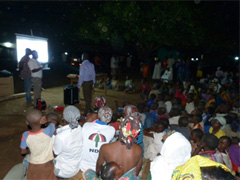 Video show in the community
Video show in the community
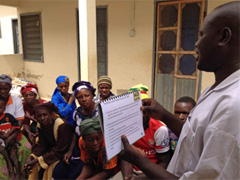 Health promotion activity using the flipchart
Health promotion activity using the flipchart
Strengthening of cooperation with local government and other stakeholders
It is also important for GHS to strengthen the partnership with local governments such as Regional Coordinating Council (RCC) and District Assembly (DA) in order to improve maternal and newborn health services. RCCs and DA play an important role in financially assisting GHS activities. For instance, they offer scholarships for health personnel, help provide means of transportation to community members during emergencies, and assist the maintenance of access roads to the CHPS compound.
Currently, support from DA varies depending on the priority of health issues. The Project needs to secure more effective support by information sharing and cooperation between GHS and local governments. In addition, the Project coordinates the work of relevant institutions in cooperation with other JICA projects and other development partners.
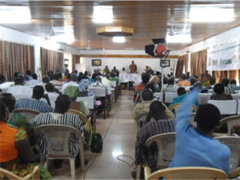 CHPS forum for DA and community leaders
CHPS forum for DA and community leaders
- About JICA
- News & Features
- Countries & Regions
- Our Work
- Thematic Issues
- Types of Assistance
- Partnerships with Other Development Partners
- Climate Change / Environmental and Social Considerations
- Evaluations
- Compliance and Anti-corruption
- Science and Technology Cooperation on Global Issues
- Research
- JICA Development Studies Program / JICA Chair
- Support for the Acceptance of Foreign HRs / Multicultural and Inclusive Community
- Publications
- Investor Relations
